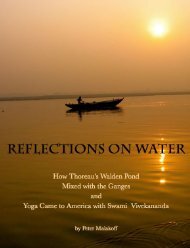How Thoreau's Walden Pond Mixed with the Ganges and Yoga Came to America with Swami Vivekananda
One early morning in 1846, during the coldest days of a New England winter, Henry David Thoreau looked out the window of his small cabin on Walden Pond and saw men cutting its ice into blocks. That ice was hauled by horse to a railroad that ran across the western edge of Walden Pond, packed into a boxcar, taken to Boston and loaded onto a clipper ship that sailed to Calcutta, India, arriving about four months later. Once there, that ice was purchased by grateful members of the East India Company. Thoreau had witnessed a small part of the global ice trade between New England and India that took place during the latter part of the nineteenth century. When Thoreau considered the ice trade, his vision sailed on metaphors far beyond the scope of business. The waters he imagined flowed both east and west and carried not just natural elements, but culture, religion and philosophy as well. He envisioned that after arriving in Calcutta, the New England ice of Walden Pond would eventually melt and run downhill where it would join with the sacred water of the Ganges. He wrote in Walden: "It appears that the sweltering inhabitants of Charleston and New Orleans, of Madras and Bombay and , drink at my well. In the morning I bathe my intellect in the stupendous and cosmogonal philosophy of the , since whose composition years of the gods have elapsed, and in comparison with which our modern world and its literature seem puny and trivial; and I doubt if that philosophy is not to be referred to a previous state of existence, so remote is its sublimity from our conceptions. I lay down the book [Bhagavad-Gita] and go to my well for water, and lo! there I meet the servant of the Bramin, priest of and and who still sits in his temple on the Ganges reading the , or dwells at the root of a tree with his crust and water jug. I meet his servant come to draw water for his master, and our buckets as it were grate together in the same well. The pure Walden water is mingled with the sacred water of the Ganges." This book tells the story of these waters . . .
One early morning in 1846, during the coldest days of a New England winter, Henry David Thoreau looked out the window of his small cabin on Walden Pond and saw men cutting its ice into blocks. That ice was hauled by horse to a railroad that ran across the western edge of Walden Pond, packed into a boxcar, taken to Boston and loaded onto a clipper ship that sailed to Calcutta, India, arriving about four months later. Once there, that ice was purchased by grateful members of the East India Company. Thoreau had witnessed a small part of the global ice trade between New England and India that took place during the latter part of the nineteenth century.
When Thoreau considered the ice trade, his vision sailed on metaphors far beyond the scope of business. The waters he imagined flowed both east and west and carried not just natural elements, but culture, religion and philosophy as well. He envisioned that after arriving in Calcutta, the New England ice of Walden Pond would eventually melt and run downhill where it would join with the sacred water of the Ganges. He wrote in Walden: "It appears that the sweltering inhabitants of Charleston and New Orleans, of Madras and Bombay and , drink at my well. In the morning I bathe my intellect in the stupendous and cosmogonal philosophy of the , since whose composition years of the gods have elapsed, and in comparison with which our modern world and its literature seem puny and trivial; and I doubt if that philosophy is not to be referred to a previous state of existence, so remote is its sublimity from our conceptions.
I lay down the book [Bhagavad-Gita] and go to my well for water, and lo! there I meet the servant of the Bramin, priest of and and who still sits in his temple on the Ganges reading the , or dwells at the root of a tree with his crust and water jug. I meet his servant come to draw water for his master, and our buckets as it were grate together in the same well. The pure Walden water is mingled with the sacred water of the Ganges."
This book tells the story of these waters . . .
Create successful ePaper yourself
Turn your PDF publications into a flip-book with our unique Google optimized e-Paper software.
knew <strong>to</strong> do was <strong>to</strong> “go fishing.” He meant that I go out on<strong>to</strong> <strong>the</strong> river of life<br />
both literally <strong>and</strong> figuratively, <strong>with</strong>out a necessity <strong>to</strong> catch a single fish, gaze at<br />
<strong>the</strong> flowing water before me <strong>and</strong> feel out <strong>to</strong> infinity, vanishing all concern in<br />
boundless meditation, <strong>and</strong> only <strong>the</strong>n open up my lure box of accumulated<br />
thoughts, wishes <strong>and</strong> desires, select one that caught my fancy, tie it <strong>to</strong> <strong>the</strong><br />
fishing line of consideration, cast out in<strong>to</strong> <strong>the</strong> flowing waters of possibility <strong>and</strong> see<br />
what fish, if any, rises <strong>to</strong> <strong>the</strong> bait, saying, “Yes!” Fuller emphasized <strong>the</strong> importance<br />
of consideration <strong>and</strong> <strong>the</strong> necessity of taking time <strong>to</strong> engage it. That is why he<br />
suggested I “go fishing.” I would benefit from a better sense of Reality <strong>and</strong> might<br />
recognize <strong>the</strong> great mystery <strong>and</strong> power of God. We are living in <strong>the</strong> midst of an<br />
endless ocean, an intelligent force far beyond our comprehension, which affects<br />
<strong>the</strong> smallest things we do. Our control of life is limited <strong>and</strong> yet interconnected . . .<br />
like a fish rising <strong>to</strong> <strong>the</strong> bait, everything is a sign of spontaneous grace. Without<br />
such appreciation our lives are like car<strong>to</strong>on characters, who have run off <strong>the</strong> edge<br />
of a cliff <strong>and</strong> even though out in <strong>the</strong> middle of space, continue <strong>to</strong> run for a while,<br />
before realizing where <strong>the</strong>y truly are: falling <strong>to</strong> a certain death. When we “go<br />
fishing,” we become aware of <strong>the</strong> infinite miracle in which we exist <strong>and</strong> notice a<br />
fish always rises, not always when we want it, but always on time.<br />
According <strong>to</strong> Joseph Campbell we can tell <strong>the</strong> dominant <strong>the</strong>me of a culture by<br />
its tallest building when we come in<strong>to</strong> <strong>to</strong>wn. In <strong>the</strong> West <strong>to</strong>day, in nearly every<br />
major city, <strong>the</strong> highest building is some sort of financial or business <strong>to</strong>wer. It looms<br />
over <strong>the</strong> city, glorifying money, competition, expertise, technology, success <strong>and</strong> <strong>the</strong><br />
triumph of individual will.<br />
In most of India it is <strong>the</strong> religious temple that rises above all o<strong>the</strong>rs, (except in<br />
<strong>the</strong> more westernized cities). Where I live in rural South India, a huge s<strong>to</strong>ne Shiva<br />
temple is higher than any o<strong>the</strong>r building in <strong>to</strong>wn <strong>and</strong> is a great living center of<br />
devotion. A different God is worshiped here <strong>and</strong> <strong>the</strong> fundamental metaphor by<br />
which people underst<strong>and</strong> <strong>the</strong>ir lives is not business, finance or money, but ra<strong>the</strong>r<br />
<strong>the</strong> sacrificial nature of life, mutual gifting, inescapable obligation <strong>to</strong> o<strong>the</strong>rs, <strong>the</strong><br />
tremendous power of karma, inexorable natural laws, <strong>the</strong> necessity of cooperation<br />
<strong>with</strong> nature <strong>and</strong> <strong>the</strong> cannot-do-<strong>with</strong>out support of community. These temples<br />
were built <strong>to</strong> glorify <strong>the</strong> nature of all <strong>and</strong> everything <strong>and</strong> dedicated <strong>to</strong> a particular<br />
96


















